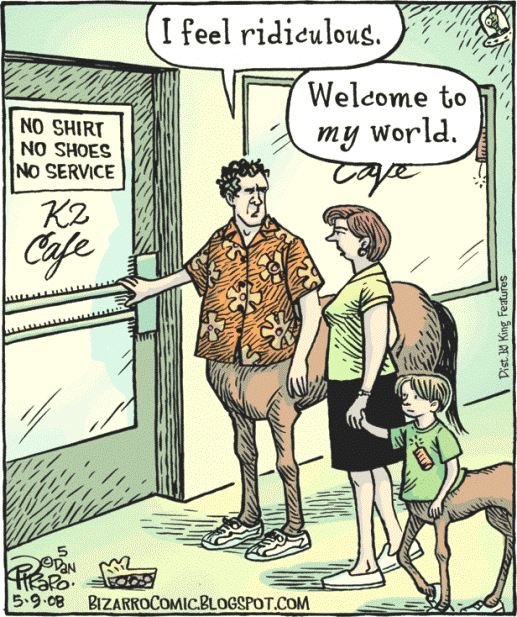
Courtesy Dan Piraro, bizarro.com
Ever since the Supreme Court ruled in favor of same-sex marriage last June, several states have proposed legislation that would “protect” religious freedom. Legislators claim that opponents of same-sex marriage who own a business need a law that protects their right – based on their religious beliefs – to refuse service to gay couples.
On Wednesday, the Missouri State Senate approved just such a measure.
As reported by The New York Times (Mar. 10), “The bill, a proposed amendment to the state Constitution, would shield religious groups and businesses from having to facilitate same-sex weddings. Opponents contended that the bill was probably unconstitutional, and that the wording could lead to much broader consequences, like denying social services, education, employment or housing to married gay people.”
The law has its genesis in The Religious Freedom Restoration Act of 1993 where individuals would be protected under the free exercise clause of the First Amendment of the U.S. Constitution. While the act was signed into law by President Clinton in 1993, the Supreme Court held that it was unconstitutional (City of Boerne v. Flores), citing that it “is not a proper exercise of Congress’s enforcement power.”
Nonetheless, individual states are working to adopt their own versions of the act.
“Twenty-one states,” The Times writes, “have what backers call religious freedom laws, which do not mention same-sex couples but make it harder to win a lawsuit for discrimination based on religious belief.
“The Missouri bill is part of a new batch of measures that explicitly address same-sex marriage and attempt to pre-empt such lawsuits entirely. None of the measures have become law so far. The Missouri bill states that clergy members and religious groups would not have to facilitate gay weddings and celebrations, a widely agreed-upon principle. But it also would give businesses like caterers and florists the right to refuse services.
“What troubles opponents most is a passage that does not mention weddings; in fact, it does not limit what actions it would apply to. The passage would shield religious groups from being penalized for acting ‘in accordance with a sincere religious belief’ about same-sex marriage, and lists many things that could qualify as religious organizations, including schools, charities and retirement homes.”
This isn’t the first time people have supported thinly veiled discrimination laws.
“Almighty God created the races white, black, yellow, malay and red, and he placed them on separate continents. And but for the interference with his arrangement there would be no cause for such marriages. The fact that he separated the races shows that he did not intend for the races to mix.”
That’s Virginia Judge Leon M. Bazile in January 6, 1959 standing by a law which prohibited the marriage of an interracial couple.
Eight years later, the Supreme Court ruled (Loving v. Virginia) the law unconstitutional.
Here’s a question for business owners who feel religiously oppressed: How does a same-sex couple who wishes to make a purchase of goods and/or services from your business threaten your religious liberty?
Hold that thought, while we look at another story.
As reported by CBS News correspondent Seth Doane (Mar. 10), “China is facing accusations it’s cracking down on the religious freedom of Christians. …

Courtesy China Aid
“The government in Zhejiang Province has removed – sometimes burned down – crosses from as many as 2,000 churches there, according to a U.S.-based religious activist group, ‘China Aid.’ …
“China’s ruling Communist Party is officially atheist. Technically, it does allow ‘freedom of religion,’ but those ‘approved’ religions must worship under the supervision of those who are faithful, first and foremost to the state. So, tens of millions of Christians meet underground in so-called ‘family churches.’ ”
In July, 2014, CBS reported that, “China has 23 million Christians, but many believe the total exceeds 35 million if home churches are counted.
“The ruling party is wary of religion as a possible rallying point to challenge its rule and uneasy about the fast spread of Christianity three decades after Beijing loosened social controls in pursuit of economic development.
“In the eastern Zhejiang province, where Christianity has been particularly popular, local governments have been tearing down crosses of Christian churches, even if they have been officially sanctioned, on the grounds that they lack construction permits.”
So, whose religious beliefs are really being threatened: millions of Christians who are forced to worship outside the preying eyes of government officials, or those who covet thinly veiled laws that foster prejudice?
Comments










